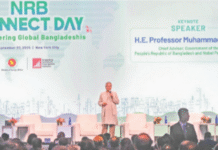As international funding dries up, Bangladesh has even resorted to taking a $407 million loan from the World Bank to support the Rohingyas. But with the country itself facing political turmoil, economic slowdown, and a tightening fiscal space, the question remains—what more can Bangladesh do?

Summary:
- Bangladesh urges the EU to increase aid for the Rohingya crisis
- US paused all foreign aid, worsening the Rohingya funding shortfall
- Bangladesh faces economic struggles, making Rohingya support harder
- UN warns of major disruptions in refugee services due to funding cuts
- NGOs are laying off workers and shutting down key Rohingya programs
Bangladesh wants the European Union to step up its contributions to the Rohingya humanitarian crisis. This was the message conveyed to a visiting EU delegation last week during the EU-Bangladesh Joint Commission meeting in Dhaka.
But here’s the real question: What’s new in this? And why is it a growing concern now?
The answer lies in two unsettling developments.
First, the United States—the largest donor after Bangladesh in supporting the over one million Rohingya refugees—has hit the brakes on all existing foreign assistance. Washington’s recent “stop-work” order threatens to deepen an already fragile funding scenario.
Second, Bangladesh itself is grappling with a tightening fiscal space. Economic activities remain subdued, inflation is biting hard, job creation has slowed, and tax revenue collection is falling short. With such internal struggles, footing the Rohingya bill is becoming an even bigger challenge.
As international funding dries up, Bangladesh has even resorted to taking a $407 million loan from the World Bank to support the Rohingyas. But with the country itself facing political turmoil, economic slowdown, and a tightening fiscal space, the question remains—what more can Bangladesh do?
Why US aid matters for displaced Rohingyas
A look at the Joint Response Plan (JRP), the UNHCR’s blueprint for Rohingya aid, reveals a stark reality—funding is shrinking, and fast.
In 2024, the JRP secured 64.4% of its target, raising $548.9 million against an appeal of $852.4 million. Of this, the US alone provided $301 million aid, which was 55% of total funds. That was when Donald Trump was not in the White House and USAID faced no restrictions. And, the EU allocated only $62.47 million (11% of the JRP) in 2024 and $46.7 million (7.5% of the JRP) in 2023 for humanitarian aid, including disaster preparedness and emergency funding.
For 2025, the UNHCR has estimated a staggering $934 million will be needed, according to documents compiled by the Economic Relations Division of Bangladesh’s Finance Ministry.
To grasp the gravity of Washington’s decision, consider this:
Since August 2017, the US government has pumped more than $2.5 billion into the regional Rohingya response, including over $2.1 billion for Bangladesh alone. Nearly $1.3 billion of that came through the Bureau of Population, Refugees, and Migration (PRM), according to a US Embassy statement issued in Dhaka on 25 September 2024.
On the same day, during a High-Level UNGA side event on the Rohingya crisis, Under Secretary of State, Uzra Zeya announced nearly $199 million in new assistance. This package included nearly $70 million through PRM and over $129 million from USAID—$78 million of which was earmarked for food procurement and distribution through the US Department of Agriculture’s Commodity Credit Corporation.
What UN tells TBS on the issue
On Sunday, The Business Standard reached out to Gwyn Lewis, the UN Resident Coordinator in Bangladesh, via email regarding the US funding cuts and their impact on the Rohingya population in Cox’s Bazar. In response, a UN spokesperson provided the following statement:
The US funding pause is affecting humanitarian and development programmes in many countries, including the Rohingya refugee response in Bangladesh. Despite some gains in resilience, the Rohingya remain substantially aid dependent, and the UN is extremely grateful for the generosity of the Government, donors and partners to ensure their needs are met.
The United States has consistently been among the most steadfast partners and largest donors to the Rohingya response since 2017, and to Bangladesh, and the humanitarian community remains grateful for US support and hopeful that this will soon resume to ensure the continued delivery of critical assistance to refugees and the host community.
There have been important service disruptions in the Rohingya refugee camps as well as in the host communities, including in life-saving interventions. Sector Coordinators and partners involved in the Rohingya response are actively mapping these challenges and putting in place mitigation/stop-gap measures where feasible.
Many sectors have been disrupted. Some examples include health (e.g. Hep C procurements, SRH procurement, disability services, etc.), water and sanitation (soap, dignity kits, water supply/waste overflow management) , protection (GBV and CP services, as well as services for persons with disabilities), education (with suspensions of learning facilities in refugee and hosting communities), and livelihoods (halting of numerous vocational/technical trainings). The consequences extend beyond service availability, raising serious concerns about broader protection and security risks, including heightened vulnerabilities within the refugee and host communities.
The humanitarian community’s current focus is on monitoring the evolving situation, addressing the most urgent gaps (including through reprioritization of available resources) and continued dedication to achieving efficiencies in humanitarian assistance. All these efforts are undertaken in close collaboration with the Government of Bangladesh, refugees and the relevant humanitarian and development stakeholders.
Shrinking funds for Rohingyas is a concern:
Bangladesh received only 50% of the requested funding in 2023—a shortfall that has been growing over the years. Since 2017, the gap between required and actual funding has steadily widened. In 2017, the shortfall stood at 27%, rising to 41% in 2020 and further escalating to 51% in 2022. This reflects a broader global trend, where humanitarian needs are outpacing available funding, leaving vulnerable populations at greater risk.
NGO layoffs, service cuts for Rohingyas
Soon after being sworn in for a second term, US President Donald Trump signed an executive order pausing US foreign aid for 90 days. The announcement sent shockwaves across governments and NGOs worldwide—from Africa to Palestine, Syria, Myanmar, and Bangladesh.
The impact was swift. On 31 January, the International Centre for Diarrhoeal Disease Research, Bangladesh (icddr,b) issued termination letters to more than 1,000 employees. Several other US-funded NGOs have also been forced to cut jobs. But according to insiders in the NGO sector, no group in Bangladesh will feel the impact more than the Rohingyas.
“USAID-funded projects for Rohingyas—except food and shelter assistance—have already been shut down. Education, healthcare, and livelihood services etc., for displaced Rohingyas are now at serious risk,” said an official from a UN organisation, requesting anonymity.
The UNHCR has already announced an 18% job cut this year, while Humanity International, which works with Rohingya refugees, has laid off 100 staff members, the official said, adding that there are many local and international NGOs that have either downsized their manpower or are planning to do so.
“About 30% of our funding in 2024 came from the US. But now we are deeply concerned—will we receive any funds this year at all?” a UNICEF official working with Rohingya refugees in Cox’s Bazar told The Business Standard, also requesting anonymity.
Currently, 117 distinct partners—10 UN agencies, 58 Bangladeshi NGOs, 35 international NGOs, and 14 other national and international organisations—are running 195 projects in Cox’s Bazar.
Bangladesh spends billions, but how much more can it bear?
Bangladesh has provided extensive humanitarian support to the Rohingyas—shelter, food, healthcare, and security—primarily in the Cox’s Bazar district. In collaboration with UN agencies and international partners, the government has ensured these displaced people receive essential aid. To ease pressure on the overcrowded camps in Cox’s Bazar, Bangladesh has relocated over 30,000 Rohingyas to Bhasan Char, developing facilities there with $350 million from its resources.
Currently, around 1.3 million Rohingyas reside in 33 camps across Ukhiya and Teknaf in Cox’s Bazar, with more than 32,000 newborns added to the population annually. Over 200,000 children have been born in the camps in the past seven years. Meanwhile, another 60,000 Myanmar nationals have recently crossed into Bangladesh, fleeing fresh conflicts in their homeland.
At an international event in late 2022, former Prime Minister Sheikh Hasina stated that Bangladesh spent $1.22 billion on the Rohingyas that year alone. In total, the country spent about $1.69 billion on these forcibly displaced Myanmar nationals (FDMNs) in 2022, according to Dr. Mohammad Mainul Islam, a professor at the University of Dhaka’s Department of Population Sciences, in an article published in The Business Standard on 13 May 2024.
As international funding dries up, Bangladesh has even resorted to taking a $407 million loan from the World Bank to support the Rohingyas. But with the country itself facing political turmoil, economic slowdown, and a tightening fiscal space, the question remains—what more can Bangladesh do?
Who will fill the gaping hole for funds?
For Bangladesh, the answer seems clear: the EU needs to step up. But according to Zahid Hussain, former lead economist of the World Bank’s Dhaka office, that won’t be easy. With the ongoing crisis in Ukraine, the EU’s top priority remains securing its continent.
Adding to the challenge, the US is pressuring the EU to ramp up its defence spending, as Washington is no longer willing to bear the costs of European security under NATO as it did in the past, Hussain pointed out. Still, Bangladesh has little choice but to push for more funds from the EU.
“As the Rohingya crisis is a regional issue, China and India should also step in to support Bangladesh,” he said. “In particular, Bangladesh should seek assistance from China. The international community must take responsibility and not leave the burden solely on Bangladesh.”









